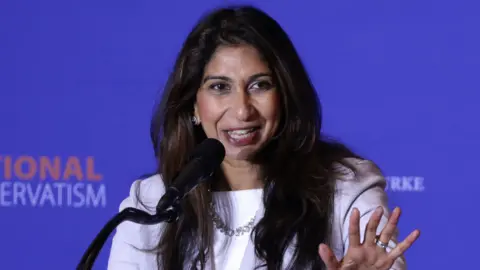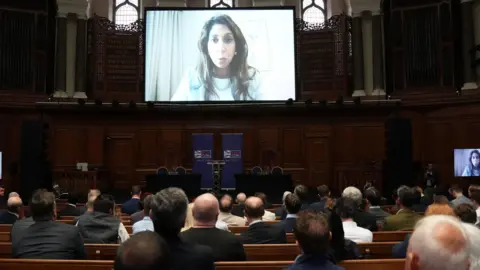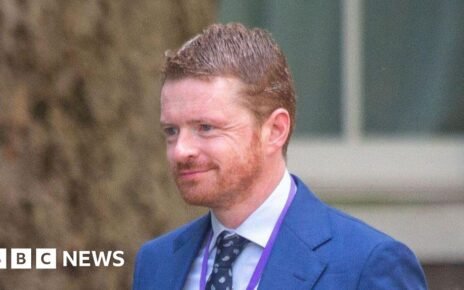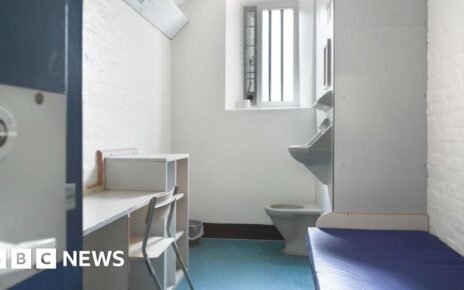[ad_1]
By Paul Seddon, Political reporter • Ben Wright, Political correspondent
 Getty Images
Getty ImagesPotential Tory leadership contender Suella Braverman has said her party must win back Reform UK voters if it is to recover from its crushing election defeat.
The former home secretary, tipped to run in the contest to replace Rishi Sunak, said Nigel Farage’s party posed an “existential threat” to the Tories.
Warning that her party no longer had the “luxury of a monopoly” over right-wing voters, she added it needed to do more focus on “core Conservative policies”.
But other senior Tories have cautioned against moving to the right, as the party seeks to recover from its lowest-ever base of MPs.
Tory Tees Valley Mayor Ben Houchen said that embracing Reform UK could prolong the party’s stretch in opposition by “many, many years”.
“Nobody in the Conservative Party that I’ve personally spoken to thinks that’s a good idea,” he added.
The Conservatives now have only 121 MPs, down 251, after an election drubbing that has posed big questions for the future direction of the party.
The Conservative vote dropped from 13.9m at the last election in 2019 to just 6.8m.
Reform UK, whose platform included a freeze on “non-essential immigration” and scrapping net zero rules, won won 4.1m votes and five MPs.
A process for deciding Mr Sunak’s replacement as Tory leader has yet to be announced, with the backbench committee that will set the rules for the contest set to pick a new leadership later on Tuesday.
No Conservative MPs have yet announced their candidacy, with a debate under way over when and how the contest should take place.
Alongside Mrs Braverman, other possible leadership contenders include former ministers Kemi Badenoch, James Cleverly, Tom Tugendhat, and Priti Patel.
Two other former ministers, Robert Jenrick and Victoria Atkins, appeared on the Sunday political shows to offer their views on the future of the party, in a sign they are also thinking of running.
‘Lunatic woke virus’
The Conservative post-mortem began at a Westminster conference of Popular Conservatism, the right-wing faction launched earlier this year by former PM Liz Truss, who lost her seat at last week’s election.
Speaking via video link from another right-wing conference in the US, Mrs Braverman urged the party to take a tougher line on immigration, cutting regulations and insulating government bodies from the “lunatic woke virus”.
She added that the rise of Reform UK was “all our own fault,” as the Conservatives had failed to address “out of control population growth” in recent years.
She added she party should also leave the European Convention on Human Rights (ECHR), arguing it had prevented ministers from tackling illegal migration.
She added that Mr Farage’s party, which began life less than five years ago as the Brexit Party, had succeeded in winning over “many of our traditional lifelong voters,” posing “an existential threat to us electorally”.
“It’s no good denigrating Reform voters. It’s no good smearing the Reform party,” she added.
“They are now their voters, and we need to do everything we can to win them back”.
 PA Media
PA MediaFormer cabinet minister Jacob Rees-Mogg, who also lost his seat last week, offered a similar solution, arguing the “Conservative family”, including Reform UK, had won 11m votes combined at last week’s poll.
He added that the result was an “alarm bell against the arrogance of presumption that we thought we had a divine right to rule and a divine right to certain voters”.
“We didn’t. We thought our core vote had nowhere else to go. They did.
“And we cannot just assume that the pendulum will swing back to us or that all the Reform voters will suddenly repent. We need to win them over one way or another.”
However, Lord Houchen warned against embracing Reform UK, adding it would prolong the Tories’ “road to redemption” with voters.
Pointing out that his party lost a string of seats to the Liberal Democrats in Tory heartlands, he added the election “wasn’t an ideological one, it was about effective governance”.
Leadership rules debate
The argument over the future direction has also been reflected in a procedural debate over how the leader should be chosen.
Re-elected Tory MP and former minister George Freeman has argued that the party’s leadership rules, introduced in 1998, should be changed to strip party members of the final vote on the winner.
He has suggested activists should whittle the longlist down to “three or four” candidates, with the party’s MPs then picking the winner.
But figures on the right of the party, including Mrs Braverman and Mr Rees-Mogg, have railed against the idea of taking the decision away from Tory members.
There is also an argument under way over when the contest should take place.
Increasingly, Conservatives have argued in favour of a longer contest, rather than rushing to choose a new leader over the summer.
Sir Graham Brady, outgoing boss of the 1922 committee that sets leadership rules, has said the need for a debate over the future leader needs to be balanced against the need to provide “effective opposition quite quickly”.
Sir Graham, who did not stand for election again, said he didn’t see “any need” for the rules to be changed to change the current voting process, under which MPs choose two final candidates that go to a members’ vote.
He added that this would require changing the party’s constitution, and there was “unlikely to be majority” for this.
[ad_2]
Source link freeslots dinogame telegram营销




